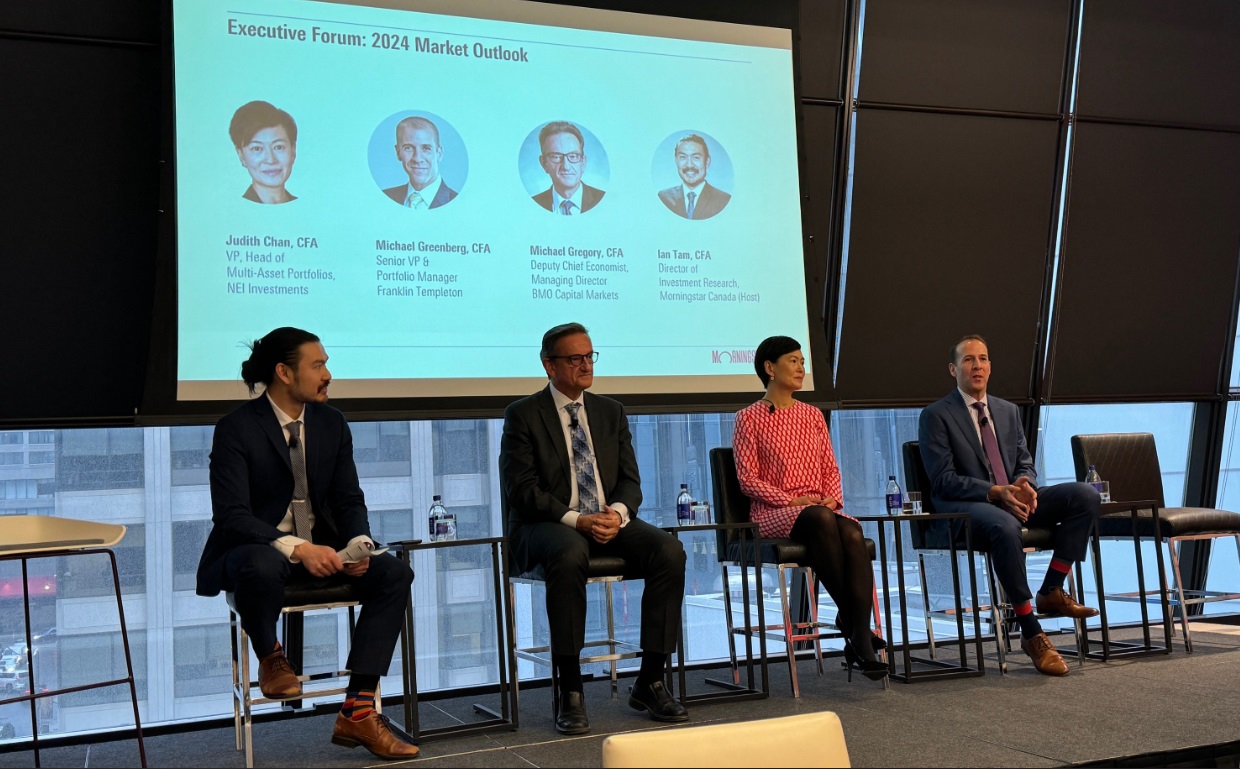
Many investors are worried about the year to come.
Even as inflation continues to be a thorn in the side of central banks and investors alike, and fears of a recession abound, interest rates appear largely on hold. Yesterday's European Central Bank decision is a case in point.
Nevertheless, a panel of experts told attendees at Morningstar's first Executive Forum for 2024 yesterday that some of these fears might be overblown.
The forum, titled The 2024 Market Outlook, addressed inflation, rate hikes, ESG, The Magnificent 7, thematic investing, and investment opportunities in 2024.
The panellists were Judith Chan, vice president and head of multi-asset portfolios at NEI Investments; Michael Greenberg, a senior vice president and portfolio manager for Franklin Templeton Investment Solutions; and Michael Gregory, deputy chief economist and managing director at BMO Capital Markets Economics.
The panel was moderated by Ian Tam, Morningstar's director of investment research for Canada.
No Recession, But Expect Slower Growth
Gregory pointed out that we are in a new normal, where rates stay higher for longer.
"I expect for the next few months the central banks will hold. In my opinion, the Bank of Canada is closer to a rate cut than the US Federal Reserve," he said.
"Growth is lacklustre in Canada, but it's strong in the US. This is important."
He also pointed out that, with the 2024 US presidential election in November, the Federal Reserve might not cut until after the poll.
Two factors now impact US growth: firstly, the multi-trillion investment in industrial policy; and secondly strong productivity growth. Greenberg and Chan both agreed with this.
"This is not a bad environment for fixed income; you get both diversification and good yield," they said.
"In my opinion, 2023 was an easy year for central banks. Now the situation is not as easy. In 2023, the banks had to only care about inflation; now they need to balance both growth and inflation."
For Franklin Templeton, the firm likes the asymmetrical returns of government bonds.
"There's little chance of losses, but the yields are high," Greenberg said.
"In our 60/40 portfolio, we are holding higher cash balances. We're currently getting 5-5.3%, it is hard to beat that for now, though, of course, this rate will fall with rate cuts.
"We could offset low double-digit gains with potentially high double-digit losses in equities should we go into a recession. To be clear, our base case is not a recession. We anticipate 'OK' growth, and rates coming down."
Chan does not see an imminent recession either. Rather, her base case is a moderate slowdown.
"It is a good environment for equities right now," she said.
"Inflation is coming down and we see no red flags in growth. Make no mistake, growth is slowing, but we don't see any red flags. Corporate earnings are delivering earnings growth, even as some companies are belt-tightening.
"We expect moderation to come in sooner rather than later but for now, we are in a good spot for equities, and at that point, company fundamentals will become even more important."
'Don't Give Up on the Magnificent Seven'
Most of the market returns in recent months have been driven by the so-called Magnificent Seven – Apple (AAPL), Microsoft (MSFT), Alphabet (GOOGL), Amazon.com (AMZN), Nvidia (NVDA), Tesla (TSLA), and Meta Platforms (META). Does this mean we're in a new dot.com bubble? No, agreed the panel.
"We are seeing froth in tech valuations just like in 1997 – but this time is different," Greenberg said.
"We are seeing real companies, with real value, taking concrete steps like buybacks. The valuations are high but can be justified. These Magnificent 7 companies are areas of long-term exposure in a portfolio. We look at the theme as having two phases – AI Enablers, and AI Adopters.
"The Magnificent Seven companies are the enablers, and the next round of money will be made by correctly identifying who the adopters will be. Diversify outside of the Magnificent Seven, but don’t go to 0% exposure on them either."
Chan goes so far as to argue this time could be considered the opposite of the bubble of the late 1990s. Speaking of the Magnificent Seven stocks, she said:
"The earnings delivery for these companies is beating expectations. Growth rates are being revised upwards. In the short-to-medium-term, it is a winner-takes-all-situation, because who will compete with the existing behemoths?
"It might take some time for the capacities of competitors to come on board, so longer term there might be competition, but for now, the growth justifies some of the premium. I expect the dominance to continue."
Going ahead, Greenberg is still looking at the US market for equity ideas, albeit with a difference. To him, "the US is the least-dirty shirt. It takes a long time for the interest rate action to get into the US economy."
"For now, we are overweight on the US equities, but are less interested in large-cap growth stocks, and are focused more on small caps, and value players, which have been left behind in the rally so far."
Investors Still Want Dividends
An investor favourite in the UK, Canada, and elsewhere, dividends will always be important to certain investors looking to make an income from their holdings.
"Dividends will be more favourably taxed than interest income, and that plays into the popularity of dividends," Chan says.
"For us, how companies allocate capital is more important, as we focus on total returns. US companies are now buying back – will this trend come to Canada? Maybe – but dividends will stay in favour."
Greenberg agreed but added that the high interest rates on cash won't last forever, and investors will have to seek higher yields elsewhere. But where?
"General portfolio management 101 says you should focus on total returns," he said.
"For example, I could get 20% on Zimbabwe debt, but could lose half my money. I'd say don’t ignore non-dividend payers – companies that buy back, or allocate differently – just to chase high dividends."
Finally, a Word on Liquid Alternatives
Greenberg and Franklin Templeton are considering liquid alternatives in 2024.
"Investment solutions are evolving, whether it's ESG, liquid alts, or crypto or other," he said.
"How investors consume their content is also changing, and so is how they buy their investments – whether it is through traditional routes, DIY, or robo-advisers.
"We are focused on building the same or similar portfolios for all our clients, but we've found that how we deliver our solutions is important."
Liquid alternatives are one such example of an evolving asset class.
"Many launch liquid alt funds that invest in high yield instruments or listed real estate. But are these liquid alts? Or are they just stocks and bonds?" he asked, adding that, when you buy an actual liquid alt, you get true diversification – but you’re also making a major bet on the manager.
"You might, for example, pick the ideal asset class, but a bad or wrong manager will erode all your gains. You need to make both an alpha and a beta bet, and that is hard. For us, we like semi-liquid alts, with an illiquidity premium. Some of our investments could be locked up for 10 years. That is a hard sell for retail investors."
Finally, whether you're considering liquid alts, cryptocurrency, artificial intelligence, or any other theme, Morningstar has long held the view that investors in thematic funds are making a trifecta bet. They are betting that they are:
• Picking a winning theme;
• Selecting a fund that is well-placed to survive and harness that theme, and
• Buying in when valuations show untapped potential.
It is difficult, if not impossible, to consistently get all three right.
This article originally appeared on our Canada sister site and has been adapted and republished for audiences in the UK




























